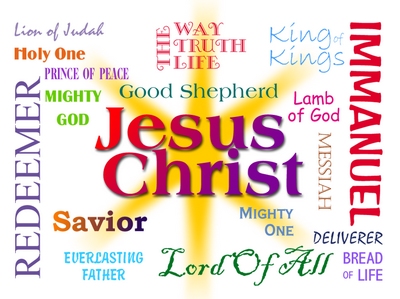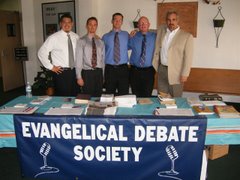
"I am both Muslim and Christian"
The Rev. Ann Holmes Redding attends the Sunday morning service at St. Clement's of Rome Episcopal Church in Seattle. Redding has been an Episcopal priest for 20 years and a Muslim for 15 months. JOHN LOK / THE SEATTLE TIMES Redding, at right, prays with other members of the Al-Islam Center recently at the Yesler Community Center. JOHN LOK / THE SEATTLE TIMES The Rev. Ann Holmes Redding, right, gets a hug from Ayesha Anderson at the end of a service recently with members of the Al-Islam Center in Seattle. Redding is a Christian who is also a practicing Muslim, and she worships with members of both faiths. STEVE RINGMAN / THE SEATTLE TIMES Redding talks with 4-year-old Celia Connor before the start of the service at St. Clement's of Rome Episcopal Church in Seattle. On Sundays, Redding often prays at St. Clement's. On Fridays, she prays with the Al-Islam Center. Relate Shortly after noon on Fridays, the Rev. Ann Holmes Redding ties on a black headscarf, preparing to pray with her Muslim group on First Hill.
On Sunday mornings, Redding puts on the white collar of an Episcopal priest.
She does both, she says, because she's Christian and Muslim. Redding, who until recently was director of faith formation at St. Mark's Episcopal Cathedral, has been a priest for more than 20 years. Now she's ready to tell people that, for the last 15 months, she's also been a Muslim — drawn to the faith after an introduction to Islamic prayers left her profoundly moved. Her announcement has provoked surprise and bewilderment in many, raising an obvious question: How can someone be both a Christian and a Muslim? But it has drawn other reactions too. Friends generally say they support her, while religious scholars are mixed: Some say that, depending on how one interprets the tenets of the two faiths, it is, indeed, possible to be both. Others consider the two faiths mutually exclusive.
"There are tenets of the faiths that are very, very different," said Kurt Fredrickson, director of the doctor of ministry program at Fuller Theological Seminary in Pasadena, Calif. "The most basic would be: What do you do with Jesus?" Christianity has historically regarded Jesus as the son of God and God incarnate, both fully human and fully divine. Muslims, though they regard Jesus as a great prophet, do not see him as divine and do not consider him the son of God. "I don't think it's possible" to be both, Fredrickson said, just like "you can't be a Republican and a Democrat." Redding, who will begin teaching the New Testament as a visiting assistant professor at Seattle University this fall, has a different analogy: "I am both Muslim and Christian, just like I'm both an American of African descent and a woman. I'm 100 percent both." Redding doesn't feel she has to resolve all the contradictions. People within one religion can't even agree on all the details, she said. "So why would I spend time to try to reconcile all of Christian belief with all of Islam? "At the most basic level, I understand the two religions to be compatible. That's all I need." She says she felt an inexplicable call to become Muslim, and to surrender to God — the meaning of the word "Islam."
"It wasn't about intellect," she said. "All I know is the calling of my heart to Islam was very much something about my identity and who I am supposed to be. "I could not not be a Muslim." Redding's situation is highly unusual. Officials at the national Episcopal Church headquarters said they are not aware of any other instance in which a priest has also been a believer in another faith. They said it's up to the local bishop to decide whether such a priest could continue in that role. Redding's bishop, the Rt. Rev. Vincent Warner, says he accepts Redding as an Episcopal priest and a Muslim, and that he finds the interfaith possibilities exciting. Her announcement, first made through a story in her diocese's newspaper, hasn't caused much controversy yet, he said.
Some local Muslim leaders are perplexed.
Being both Muslim and Christian — "I don't know how that works," said Hisham Farajallah,
president of the Islamic Center of Washington.
But Redding has been embraced by leaders at the Al-Islam Center of Seattle, the Muslim group she prays with. "Islam doesn't say if you're a Christian, you're not a Muslim," said programming director Ayesha Anderson. "Islam doesn't lay it out like that." Redding believes telling her story can help ease religious tensions, and she hopes it can be a step toward her dream of creating an institute to study Judaism, Christianity and Islam. "I think this thing that's happened to me can be a sign of hope," she said. Finding a religion that fit
Redding is 55 and single, with deep brown eyes, dreadlocks and a voice that becomes easily impassioned when talking about faith.
Some local Muslim leaders are perplexed.
Being both Muslim and Christian — "I don't know how that works," said Hisham Farajallah,
president of the Islamic Center of Washington.
But Redding has been embraced by leaders at the Al-Islam Center of Seattle, the Muslim group she prays with. "Islam doesn't say if you're a Christian, you're not a Muslim," said programming director Ayesha Anderson. "Islam doesn't lay it out like that." Redding believes telling her story can help ease religious tensions, and she hopes it can be a step toward her dream of creating an institute to study Judaism, Christianity and Islam. "I think this thing that's happened to me can be a sign of hope," she said. Finding a religion that fit
Redding is 55 and single, with deep brown eyes, dreadlocks and a voice that becomes easily impassioned when talking about faith.
She's also a classically trained singer, and has sung at jazz nights at St. Mark's.
The oldest of three girls, Redding grew up in Pennsylvania in a high-achieving, intellectual family. Her father was one of the lawyers who argued the landmark Brown v. Board of Education Supreme Court case that desegregated the nation's public schools. Her mother was in the first class of Fulbright scholars. Though her parents weren't particularly religious, they had her baptized and sent her to an Episcopal Sunday school. She has always sensed that God existed and God loved her, even when things got bleak — which they did. She experienced racism in schools, was sexually abused and, by the time she was a young adult, was struggling with alcohol addiction; she's been in recovery for 20 years. Despite those difficulties, she graduated from Brown University, earned master's degrees from two seminaries and received her Ph.D. in New Testament from Union Theological Seminary in New York City. She felt called to the priesthood and was ordained in 1984.
As much as she loves her church, she has always challenged it. She calls Christianity the "world religion of privilege." She has never believed in original sin. And for years she struggled with the nature of Jesus' divinity.
She found a good fit at St. Mark's, coming to the flagship of the Episcopal Church in Western Washington in 2001. She was in charge of programs to form and deepen people's faith until March this year when she was one of three employees laid off for budget reasons. The dean of the cathedral said Redding's exploration of Islam had nothing to do with her layoff. Ironically, it was at St. Mark's that she first became drawn to Islam.
In fall 2005, a local Muslim leader gave a talk at the cathedral, then prayed before those attending. Redding was moved. As he dropped to his knees and stretched forward against the floor, it seemed to her that his whole body was involved in surrendering to God. Then in the spring, at a St. Mark's interfaith class, another Muslim leader taught a chanted prayer and led a meditation on opening one's heart. The chanting appealed to the singer in Redding; the meditation spoke to her heart. She began saying the prayer daily. Around that time, her mother died, and then "I was in a situation that I could not handle by any other means, other than a total surrender to God," she said.
She still doesn't know why that meant she had to become a Muslim. All she knows is "when God gives you an invitation, you don't turn it down."
In March 2006, she said her shahada — the profession of faith — testifying that there is only one God and that Mohammed is his messenger. She became a Muslim.
Before she took the shahada, she read a lot about Islam. Afterward, she learned from local Muslim leaders, including those in Islam's largest denomination — Sunni — and those in the Sufi mystical tradition of Islam. She began praying with the Al-Islam Center, a Sunni group that is predominantly African-American.
There were moments when practicing Islam seemed like coming home. In Seattle's Episcopal circles, Redding had mixed largely with white people. "To walk into Al-Islam and be reminded that there are more people of color in the world than white people, that in itself is a relief," she said.
She found the discipline of praying five times a day — one of the five pillars of Islam that all Muslims are supposed to follow — gave her the deep sense of connection with God that she yearned for.
It came from "knowing at all times I'm in between prayers." She likens it to being in love, constantly looking forward to having "all these dates with God. ... Living a life where you're remembering God intentionally, consciously, just changes everything." Friends who didn't know she was practicing Islam told her she glowed.
Aside from the established sets of prayers she recites in Arabic fives times each day, Redding says her prayers are neither uniquely Islamic nor Christian. They're simply her private talks with God or Allah — she uses both names interchangeably. "It's the same person, praying to the same God." In many ways, she says, "coming to Islam was like coming into a family with whom I'd been estranged. We have not only the same God, but the same ancestor with Abraham." A shared beginning Indeed, Islam, Christianity and Judaism trace their roots to Abraham, the patriarch of Judaism who is also considered the spiritual father of all three faiths.
They share a common belief in one God, and there are certain similar stories in their holy texts. But there are many significant differences, too. Muslims regard the Quran as the unadulterated word of God, delivered through the angel Gabriel to Mohammed. While they believe the Torah and the Gospels include revelations from God, they believe those revelations have been misinterpreted or mishandled by humans. Most significantly, Muslims and Christians disagree over the divinity of Jesus. Muslims generally believe in Jesus' virgin birth, that he was a messenger of God, that he ascended to heaven alive and that he will come back at the end of time to destroy evil. They do not believe in the Trinity, in the divinity of Jesus or in his death and resurrection. For Christians, belief in Jesus' divinity, and that he died on the cross and was resurrected, lie at the heart of the faith, as does the belief that there is one God who consists of the Father, Son and Holy Spirit. Redding's views, even before she embraced Islam, were more interpretive than literal. She believes the Trinity is an idea about God and cannot be taken literally. She does not believe Jesus and God are the same, but rather that God is more than Jesus. She believes Jesus is the son of God insofar as all humans are the children of God, and that Jesus is divine, just as all humans are divine — because God dwells in all humans. What makes Jesus unique, she believes, is that out of all humans, he most embodied being filled with God and identifying completely with God's will. She does believe that Jesus died on the cross and was resurrected, and acknowledges those beliefs conflict with the teachings of the Quran. "That's something I'll find a challenge the rest of my life," she said. She considers Jesus her savior. At times of despair, because she knows Jesus suffered and overcame suffering, "he has connected me with God," she said. That's not to say she couldn't develop as deep a relationship with Mohammed. "I'm still getting to know him," she said. Matter of interpretation Some religious scholars understand Redding's thinking. While the popular Christian view is that Jesus is God and that he came to Earth and took on a human body, other Christians believe his divinity means that he embodied the spirit of God in his life and work, said Eugene Webb, professor emeritus of comparative religion at the University of Washington. Webb says it's possible to be both Muslim and Christian: "It's a matter of interpretation. But a lot of people on both sides do not believe in interpretation. " Ihsan Bagby, associate professor of Islamic studies at the University of Kentucky, agrees with Webb, and adds that Islam tends to be a little more flexible. Muslims can have faith in Jesus, he said, as long as they believe in Mohammed's message. Other scholars are skeptical. "The theological beliefs are irreconcilable," said Mahmoud Ayoub, professor of Islamic studies and comparative religion at Temple University in Philadelphia. Islam holds that God is one, unique, indivisible. "For Muslims to say Jesus is God would be blasphemy." Frank Spina, an Episcopal priest and also a professor of Old Testament and biblical theology at Seattle Pacific University, puts it bluntly. "I just do not think this sort of thing works," he said. "I think you have to give up what is essential to Christianity to make the moves that she has done. "The essence of Christianity was not that Jesus was a great rabbi or even a great prophet, but that he is the very incarnation of the God that created the world....
Christianity stands or falls on who Jesus is." Spina also says that as priests, he and Redding have taken vows of commitment to the doctrines of the church. "That means none of us get to work out what we think all by ourselves." Redding knows there are many Christians and Muslims who will not accept her as both. "I don't care," she says. "They can't take away my baptism." And as she understands it, once she's made her profession of faith to become a Muslim, no one can say she isn't that, either. While she doesn't rule out that one day she may choose one or the other, it's more likely "that I'm going to be 100 percent Christian and 100 percent Muslim when I die." Deepened spirituality These days, Redding usually carries a headscarf with her wherever she goes so she can pray five times a day. On Fridays, she prays with about 20 others at the Al-Islam Center. On Sundays, she prays in church, usually at St. Clement's of Rome in the Mount Baker neighborhood. One thing she prays for every day: "I pray not to cause scandal or bring shame upon either of my traditions." Being Muslim has given her insights into Christianity, she said. For instance, because Islam regards Jesus as human, not divine, it reinforces for her that "we can be like Jesus. There are no excuses."
Doug Thorpe, who served on St. Mark's faith-formation committee with Redding, said he's trying to understand all the dimensions of her faith choices. But he saw how it deepened her spirituality. And it spurred him to read the Quran and think more deeply about his own faith. He believes Redding is being called. She is, "by her very presence, a bridge person," Thorpe said. "And we desperately need those bridge persons." In Redding's car, she has hung up a cross she made of clear crystal beads. Next to it, she has dangled a heart-shaped leather object etched with the Arabic symbol for Allah. "For me, that symbolizes who I am," Redding said. "I look through Jesus and I see Allah."










